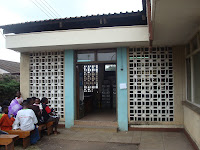 In our attempts to access the viability of "pill check" in Nairobi, we have had to jump through some hurdles but were able to get to some "big people" on the top. Mainly, these past few days, we have talked to the chief pharmacist at Kenyatta Hospital (Kenya's National Hospital), the field services manager at M.E.D.S (Mission for Essential Drugs and Supplies), the director of the Kenyan Drug and Poisnous Inspectorate Department and one of the people in charge with registration of all drugs that come from outside the country.
In our attempts to access the viability of "pill check" in Nairobi, we have had to jump through some hurdles but were able to get to some "big people" on the top. Mainly, these past few days, we have talked to the chief pharmacist at Kenyatta Hospital (Kenya's National Hospital), the field services manager at M.E.D.S (Mission for Essential Drugs and Supplies), the director of the Kenyan Drug and Poisnous Inspectorate Department and one of the people in charge with registration of all drugs that come from outside the country.
 <--(MEDS "Commitment Statement", and me touring the facilities) In our meetings, it has become clear that the people who are working in these agencies see "pill check" as an application that would work in some form in Kenya. Mainly, we have been told that this kind of system might not work in Kibera ( which is the place where we focused on for the class). Because in Kibera, there are many unregistered pharmacies and people do not understand the actual implications and consequences of using brand name drugs, generic drugs or counterfeit drugs. In fact, one "pharmacist" we talked to in Kibera, used these terms interchangeably.
<--(MEDS "Commitment Statement", and me touring the facilities) In our meetings, it has become clear that the people who are working in these agencies see "pill check" as an application that would work in some form in Kenya. Mainly, we have been told that this kind of system might not work in Kibera ( which is the place where we focused on for the class). Because in Kibera, there are many unregistered pharmacies and people do not understand the actual implications and consequences of using brand name drugs, generic drugs or counterfeit drugs. In fact, one "pharmacist" we talked to in Kibera, used these terms interchangeably. 
 From the Pharmacy and Poisonous Board, we were informed that a task force has been instituted to register legitimate pharmacies in Kenya. When pharmacies are registered, issued, certificates are to be placed somewhere in the vicinity of the pharmacy and in addition, either the pharmacist or the pharmacist technician should wear a badge. (See Left for samples of badges to be displayed.
From the Pharmacy and Poisonous Board, we were informed that a task force has been instituted to register legitimate pharmacies in Kenya. When pharmacies are registered, issued, certificates are to be placed somewhere in the vicinity of the pharmacy and in addition, either the pharmacist or the pharmacist technician should wear a badge. (See Left for samples of badges to be displayed. Our findings last week prove to us that there is a lot of bureaucracy in the drug supply chain here in Kenya. Things are not as straight forward as one would like, which makes it extremely difficult to find out what the exact needs are. This week, we have identified and are meeting with an international organization (Health Action International Africa). HAI is part of an independent global network working to increase access to essential medicines and improve their rational use through research.





